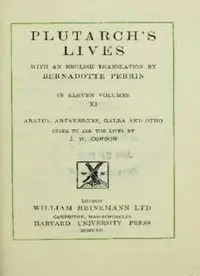Table Of ContentPLUTARCH'S
LIVES
WITH AN ENGLISH TRANSLATION BY
BERNADOTTE PERRIN
iN ELEVEN VOLUMES
XI
ARATUS, ARTAXERXES, GALEA AND OTHO
INDEX TO ALL THE LIVES BY
J. W. COHOON
LONDON
WILLIAM HEINEMANN LTD
CAMBRIDGE, MASSACHUSETTS
HARVARD UNIVERSITY PRESS
MCMLXII
/
First printed 1926
Reprinted 1943, 1954, 1962
^4^JAN2819S9'
)j
Printed in Oreat Britain
CONTENTS
PAGE
ORDER OF THE PARALLEL LIVES IN THIS EDITION . . vi
TRADITIONAL ORDER OF THE PARALLEL LIVES . . . Vii
ARATUS 1
ARTAXERXKS 127
GALEA 205
OTHO 275
INDEX 321
ORDER OF THE PARALLEL LIVES IN THIS
EDITION IN THE CHRONOLOGICAL SEQUENCE
OF THE GREEK LIVES.
Volume I. Volume VI.
(1) Theseus and Romulus. (22) Dion and Brutus.
Comparison.
Comparison.
(2) Lycurgus and Numa. (7) Timoleon and Aemilius
Paulus.
Comparison.
Comparison.
(3) Solon and Publicola.
Comparison. Volume VII.
(20) Demosthenes and Cicero.
Volume II.
Comparison.
(4) Themistocles and (17) Alexander and Julius
Camillus. Caesar.
(9) Aristides and Cato the Volume VIII.
Elder.
(15) Sertorius and Eumenes.
Comparison.
Comparison.
(13) Cimon and LucuUus.
(18) Phocion and Cato the
Comparison.
Younger.
Volume III.
Volume IX.
(5) Pericles and Fabius Max-
(21) Demetrius and Antony.
imus.
Comparison.
Comparison.
(11) PyrrhusandCaiusMarius.
(14) Nicias and Crassus.
Comparison.
Volume X.
Volume IV. (19) Agis and Cleomenes, and
Tiberius and Caius
(6) Alcibiades and Coriola
Gracchus.
nus.
Comparison.
Comparison.
(12) Lysander and Sulla. (10) Philopoemen and Flam-
ininus.
Comparison
Comparison.
Volume V. Volume XI.
(16) Agesilaiis and Ponipey. (23) Aratus.
Comparis(m. (24) Artaxerxes
(8) Peloi)idas and Marcellus. (25) Galba.
Comparison. (26) Otho.
yi
THE TRADITIONAL ORDER OF THE
PARALLEL LIVES.
(1) Theseus and Romulus.
(2) Lycurgus and Numa,
(3) Solon and Publicola.
(4) Themistocles and Camillus.
(5) Pericles and Fabius Maximus.
(tJ) Alcibiades and Coriolanus.
(7) Timoleon and Aemilius Paulus.
(8) Pelopidas and Marcellus.
(9) Aristides and Cato the Elder.
(10) Philopoemen and Flamininus.
(11) Pyrrhus and Caius Marius.
(12) Lysander and Sulla.
(18) Cimon and Lucullus.
(14) Xicias and Crassua.
(15) Sertorius and Eumenes.
(16) Agesilaiis and Pompey.
(17) Alexander and Julius Caesar.
(18) Phocion and Cato the Younger.
(19) Agis and Cleomenes, and Tiberius and Caius
Gracchus.
(20) Demosthenes and Cicero.
(21) Demetrius and Antony.
(22) Dion and Brutus,
(23) Aratus.
(24) Artaxerxes.
(25) Galba.
(26) Otho.
ARATUS
; ;
APAT02
I. UapoL/jLiav Tiva iroKaidv, w TLoXvfcpare'^, T'aris
heiaa<; jjlol hoicet to Bvacf^rj/jtov avTrj<;, 6 ^tXocro^o? a. 1624
XyOUCrtTTTTO?, 0U% OV 6%et TpOTTOV, aX)C 609 avTo^ 1027
ftlero /SeXriov elvaL, hiarldeTai,
Tt9 irarep* alvrjaei, el /irj €v8al/jLove<; viol
I^iovvaohcopo^ Be 6 TpoL^'^vio^i eXeyxjcov avrov
avreKTiOrjau rrjv a\r)Ocvr]V oi/ro)? e'X^ovaav
Tt9 irarep alvi^aet, el /jltj KaKohaifiove^ viol
2 Kai (prjao TOt'9 «</)' avrcov ovSevo^; d^L0v<; ovraf;,
virohvoixevov<; he irpcyovwv tlvmv dperat<; ^ icaX
7rX€ovd^ovTa<; ev tol<; efcelvcov eiraivoi^ vtto t^9
7rapoc/jiui<; eTrcaro/jii^eaOaL' dXX! w ye (jyvcrei to
yevvalov eTnTrpeTrec e/c rrarepoDV, Kara YVivhapoVt^
wairep (Tol 7rpo<; to KoXXcaTov cK^ofiOLovvTt, tcop
OLKodev TrapaheLy/jLaTcov top /Slop, evBaifiop dv etrj
to /JL€p,prjaOat tmp diro yepov<i dpiaTCov, dKovopTa<^
3 irepl avTcop del ti fcal \eyopTa<;. ov yap IBlcop
^ apfTois Sint. and Ziegler with Sk; Bekker has aperds,
with inferior MSS.
' Pyih. viii. 44f. {<pvq. ...«'« iraTipwv iraurl A^/ta).
——
ARATUS
I. There is an ancient proverb, Polycrates/ which
the philosopher Chrvsippus puts not as it really is,
but as he thought better :
"Who will praise a father, except happy
sons ?
But Dionysodorus of Troezen corrects him, and
restores the true form thus :
" Who will praise a father, except unhappy
sons?
And he says that the proverb stops the mouths
of those who, being worthless in themselves, take
refuge in the virtues of certain ancestors and are
forever praising them. But surely for a .man in
whom, to use Pindar's words, '^ the noble spirit
naturally displayes itself as inherited from sires,"
and who, like thee, patterns his life after the
fairest examples in his family line,—for such men it
will be good fortune to be reminded of their noblest
progenitors, ever and anon hearing the story of them,
or telling it themselves. For it is not that they lack
^ A friend of Plutarch, not otherwise known, to whom he
thus dedicates this Life. See the note on the 2'heseus, i. 1.
PLUTARCH'S LIVES
(LTTopia /caXcov i^aprcoatv ciWorpiwv iiraLvayv rr)u
So^av, dWa rol'i i/celvcoi^ ra olfceca cruvdiTrovTe'i;,
W9 KCii rov yevovs koi tov I3lov Ka6r)y€fjLova^
€V(f)r]fjL0V(7L. ^tb fcdyo) rov 'Apdrov rov crov ttoXl-
Tov Kol irpoTrdropo's /3lov, ov ovre rfj So^rj rfj
irepl creavTov ovre rfj Bvvdfjbet, KaraLcr)(^vveL<s, uttg-
crraXKd aoL (TV<y<ypa^diJLevo<;y ou^ co? ov)(l Travrcov
aKpi^icrrard croc fieixe\^^KO<; e'f dp^rj<i iiriaTaaOai
4 Ta? 6Keivov Trpd^eif}, aXX' otto)? ol TralSi^; aov
Tlo\vKpdTr)<; koI n.vOoK\rj<; oliceioL<i irapaSeLj/JLa-
(TLV ipTpecjicopTai, ra fiev d/covovT€<;, rd Be dva-
yivcoaKovre^;, direp avrov^ /jLc/jLelaOai, 7rpoar)K6L.
(PiXavTov <ydp dvBpo^;, ov <f)L\oKd\ov, 7ravT0<i dei,
iSeXrLCTTOP r)y€L(j0aL.
II. *H %LKV(0vi(OV TToXl^, ilTel TO ITpUiTOV ifC T%
aKpdrov koI Aa)pL/crj(; dpicnoKparia'; coa-irep dpfxa-
via^ avy^vOeiarj'^ et? ardaet^ eveireae Kai <^i\o-
rLfXia<; hrjiiayoyyoyv, ovk eTravaaro voaovaa Kai
raparrofievT] Kai Tvpauvov e/c rvpdvvov fMera/SaX-
Xovaa, fi^XP^ ^^ K.Xewvo'^ dvaipedevrofi eiXovTO
Ti/JLOKXeiBav dp^^ovra koX K^XeLviav, dvSpa<; iv-
ho^ov^ rd /jidXiara kol iv Svvd/iei, rcov ttoXltmv
2 ovra^. ijSr) Si nva t/}? TToX^Tfita? Kardaraaiv
e^eLV BoKOvarj'i Ti/jLOKXelSa^ /xev direOavev, A^av- 1028
Tiha^ he 6 Waaiov rupavviha TrpdrrcDV eavro)
TOV KXe^vlav uTriKTeive /cal rcov (jiiXwv Kai OL/ceLcov
TOL'9 /jLev e^i(3aXe, tou? Be dvelXev, i^rjreL Be
Kai rov VLOv avrov, "Aparov, dveXelv, eTrraerrj
3 KaraXeXeififJiivov. iv Be rfj irepl rrjv oUiav ra-
* In 264 B.C.

